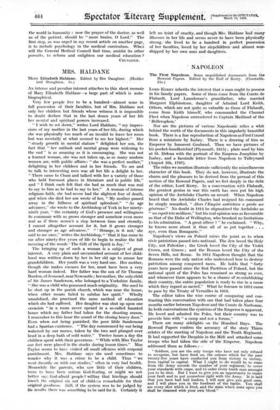NAPOLEON
LORD KERRY inherits the interest that a man ought to possess in his family papers. Some of them come from the Comte de
Flahault, Lord _Lansdowne's grandfather, who married Margaret Elphinstone, daughter of Admiral Lord Keith. Others, which are not quite so valuable as -those of Flahault,
come from Keith himself, who commanded the Channel Fleet when Napoleon surrendered to. Captain Maitland of the
' Bellerophon. '
Nor are the pictures of various Napoleonic relics a whit behind the worth of the documents in this singularly beautiful book. There is a fine reproduction of Napoleon as First Consul from a miniature by Isabey. There 'is a drawing of him as Emperor by Innocent tGoubaud. Then we have pictures of his pocket-handkerchief (Plymouth, 1815) ; plate used by him at St. Helena with the portrait of the Empress Josephine by Isabey, and a facsimile letter from Napoleon to Talleyrand (August 5th, 1797). . .
The relics we mention illustrate sufficiently the miscellaneous character of this book. They do not, however, illustrate the charm and the pleasure to be derived from the perusal of this section of the BowoOd Papers, and we feel deeply in the debt of the editor, Lord Kerry. In a conversation with Flahault, the greatest genius in war this earth has seen put his high opinion of the Archduke Charles on record-. When Napoleon heard that the Archduke Charles had resigned his command he simply remarked, " Alors rEnzpire autrichien a perdu sys gineraux." No doubt in 1814 he stigmatized the Archduke as " tan esprit tres mediocre," but his. real opinion was as favourable as that of the. Duke of Wellingtone who brooked no limitations to his admiration. `.` A great officer ? " he exclaimed. " Why, he knows more about it than all of us put together . . .
aye, even than Bonaparte." -
Napoleon's views on Poland raises the point as to when civic patriotism passed into national. The Jets, loved the Holy City, not Palestine ; the Greek loved the City of the Violet Crown, not Greece ; and the Roman loved the City of the Seven Hills, not Rome. In 1812 Napoleon thought ,that the Romans were the only nation who understood how to destroy patriotism among conquered races. He holds that " forty years have passed since the first Partition of Poland, but the national spirit-of the Poles- as remained as strong as ever, and whenever there appears to be a chance of re-establishing their country, the entire population is ready to rise in a cause which they regard as sacred." What he foresaw in 1812 came to pass by the Treaty of Versailles in 1919.
The editor takes the wise course of comparing and con- trasting this conversation with one that had taken place four months earlier between Napoleon'and the Comte de Narbonne. In both conversations the cynicism of the Emperor is apparent. He loved and admired the Poles, but their country was to provide him with " a camp and not a forum."
There are many sidelighti on the Hundred Days. The Bowood Papers confirm the accuracy of the story Thiers .relates of the meeting of Napoleon and the Tenth Regiment. It had supported the Dauphin in the Midi and attacked some troops who had taken the' side - of 'the -Eiloperor. Napoleon addressed them as follows :— " Soldiers, you are the only troops who have not only refused to recognize, but have fired on, the .colours which for the past twenty-five years have conducted you from victory to victory, from capital to capital. What I _ought to do would be to erase from the 'Array records the number of your reginient,1 to cover your standards with crape,- and-to- order every tenth man amongst you to be shot. But I want to give you an opportunity to repair your fault and to put yourselves right with the Army. It is said that you have had bad leaders, I will now give you good ones, and I will place you in the forefront of the bittle. You shall see every shot which is fired, and the stain which rests upon you shall be cleansed with your own blood.i' - _ . .






























































 Previous page
Previous page